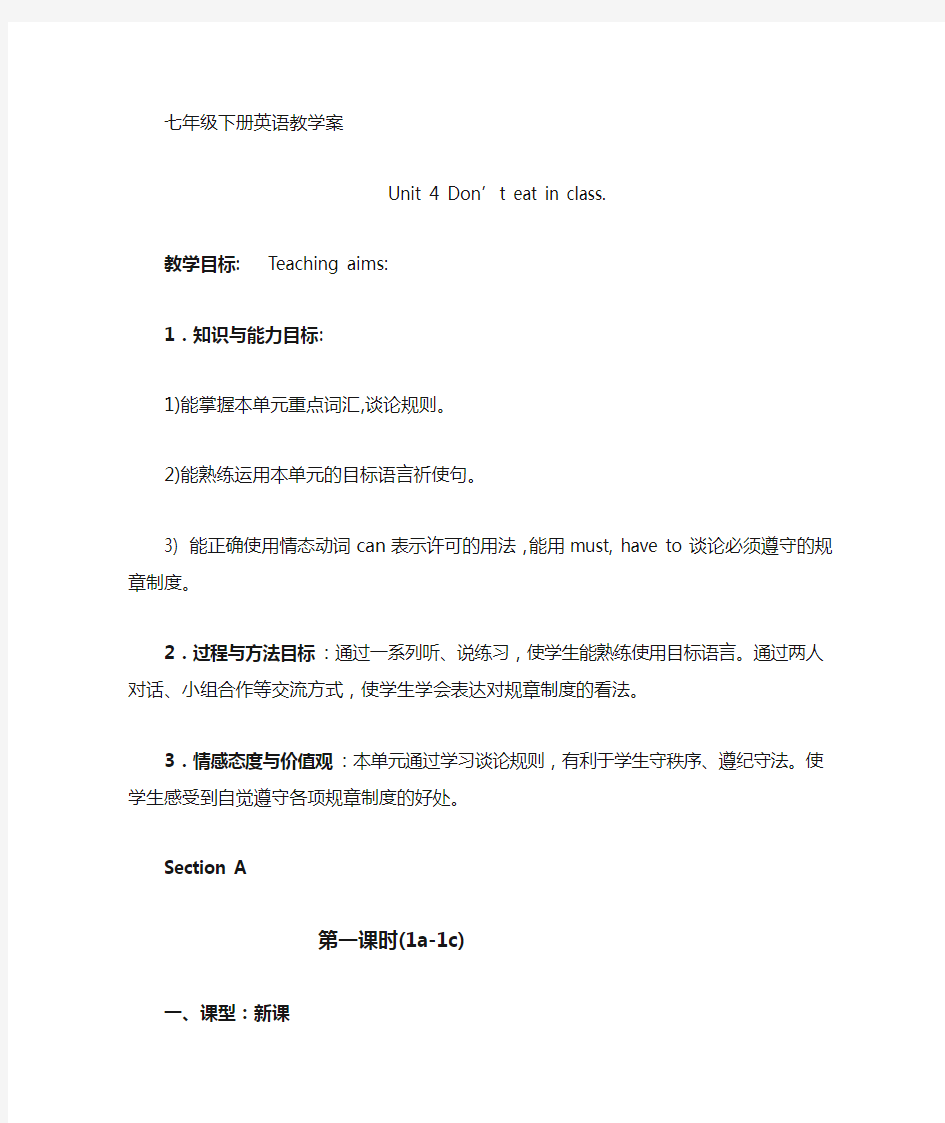

七年级下册英语教学案
Unit 4 Don’t eat in class.
教学目标: Teaching aims:
1.知识与能力目标:
1)能掌握本单元重点词汇,谈论规则。
2)能熟练运用本单元的目标语言祈使句。
3) 能正确使用情态动词can表示许可的用法,能用must, have to谈论必须遵守的规章制度。
2.过程与方法目标:通过一系列听、说练习,使学生能熟练使用目标语言。通过两人对话、小组合作等交流方式,使学生学会表达对规章制度的看法。3.情感态度与价值观:本单元通过学习谈论规则,有利于学生守秩序、遵纪守法。使学生感受到自觉遵守各项规章制度的好处。
Section A
第一课时(1a-1c)
一、课型:新课
二、教学重难点:
重点词汇:rule, arrive, hallway, hall, dining ball, listen, listen to…,fight, sorry, outside, wear, important, bring, player, uniform, quiet
重点句子:Don’t run in the hallways.
Sorry, Ms. Clark.
What are the rules?
三、教学准备:多媒体,录音机
四.教学过程:
1.课前预习
新词汇rule, arrive, hallway, hall, dining ball, listen, listen to…,
2.正课教授
(1)引入
Greet the class.
( 2 )语言知识详细讲解
1. Don’t run in the hallways. 别在走廊里跑。
祈使句,表示请求,命令,劝告等,通常省略主语you.其后谓语动词用原形。有肯定和否定两种。
Stand up, please. 起立。
Let’s go to the park.
否定的祈使句是在动词前加Don’t.
Don’t eat in class.
Don’t swim in the river.
2. What are the rules? Well, we can’t arrive late for class.
rule 作名词obey the rules
be against the rules
break the rules
rule 作动词统治,支配
eg: The king ruled the country 500 years ago.
3.祈使句型
a.V型(行为动词原形)+其他
Listen to me, please.
b.B型(Be+形容词+其他)
Please be quiet.
c.L型祈使句
Let+sb+V原+其他
Let me help you./ Let’s go.
d.D型祈使句
Don’t+V原+其他
Don’t eat in class.
3.课堂小结:
__________________________________________________________________
__________________________________________________________________ 五.板书设计
Unit4 Don’t eat in class.
1)Don’t eat in class.
2)Don’t run in the hallways.
Sorry, Ms. Clark.
What are the rules?
六.作业布置
抄写单词表单词在课堂练习本上。
七.教学反思
__________________________________________________________________ __________________________________________________________________
SectionA
第二课时(2a-2d)
一.课型:新课
二.教学重难点:
1)掌握祈使句的基本结构
2)掌握相关规则
3) 情态动词 can,have to 的用法
三.教学准备:多媒体,录音机
四.教学过程:
课前预习
预习P32 2a单词,2d Role-play the conversation,
1.正课教授
(1)引入
学生分角色朗读对话。
( 2 )语言知识详细讲解
1.arrive 到达不及物动词,后面接名词,
要加介词in或者at(大地点用in,小地点用at)
When did you arrive in Shanghai?
When we arrived at the school, it was 7:50.
arrive 后不接名词,就不用介词。
After you arrive(here/there),please call me.
2.can 情态动词,不能单独做谓语,没有人称和数的变化。
a. 表示“许可”Can I sit here? No, you can’t.
b. 表示“能,会”某种能力Can she speak English?
3.课堂小结:
__________________________________________________________________
__________________________________________________________________ 五.板书设计
Can 情态动词
Can I sit here?
Can you play the guitar?
六.作业布置
Section A课堂点睛
七.教学反思:
_____________________________________________________________________ _____________________________________________________________________
SectionB
第三课时(1a-1e)
一.课型:新课
二.教学重难点:
1. 重点词汇:practice dish dirty kitchen relax strict remember
重点句型:Don’t leave the dirty dishes in the kitchen.
Don’t be noisy.
I know how you feel,
2.难点:掌握祈使句
三.教学准备:多媒体,录音机
四.教学过程:
1.课前预习
预习P23 2b
2.正课教授
(1)引入
Teacher ask, student answer about their ideal school.
( 2 )语言知识详细讲解
词组:go out see friends do his homework
1.practice v.练习
practice doing sth
practice the guitar do the dishes
eg: She practices playing the guitar every day. 她每天练习弹吉他。
2.Make breakfast=cook breakfast 做早餐
Make sb. +adj使某人……
Make him happy
3.have to 务必强调客观需要
must 有义务,必须,强调说话人的主观看法
eg: We have to follow the school rules,我们务必遵守学校规章制度。
We must be on time for school.我们必须按时到校。
3.课堂小结:
__________________________________________________________________
__________________________________________________________________ 五.板书设计
practice doing sth
practice the guitar
do the dishes
make breakfast=cook breakfast 做早餐
make sb. +adj使某人……
make him happy
六.作业布置
课堂点睛,辅导报。
七.教学反思
_______________________________________________________________________________ _______________________________________________________________________________
SectionB
第四课时(2a-self check)
一、课型:新课
二、教学重难点:
1.重点词汇:noisy relax terrible strict follow learn
重点句型:
2.难点:能熟练运用情态动词can, must以及have to.
三、教学准备:多媒体,录音机
四.教学过程:
1.课前预习
熟读2b课文。
2.正课教授
(1)引入
复习本单元学过的句型。
( 2 )语言知识详细讲解
1.too much 太多修饰不可数名词
much too 极其,非常,太……相当于very
too many 太多修饰可数名词
2.strict 严格的,严厉的
be strict with sb 对某人要求严格
be strict in sth 对某事要求严格
I have a strict father.
My Chinese teacher is very strict with me in everything.
3.follow 遵循跟随
Please follow me.
Follow the rules.
Follow the doctor’s advice.遵循医生的建议。
3.课堂小结:
__________________________________________________________________
__________________________________________________________________ 五.板书设计
be strict with sb 对某人要求严格
be strict in sth 对某事要求严格
Please follow me.
Follow the rules.
六.作业布置
写一篇关于在学校要遵循的规则的作文。70词左右。
七.教学反思
_______________________________________________________________________________ _______________________________________________________________________________ _______________________________________________________________________________